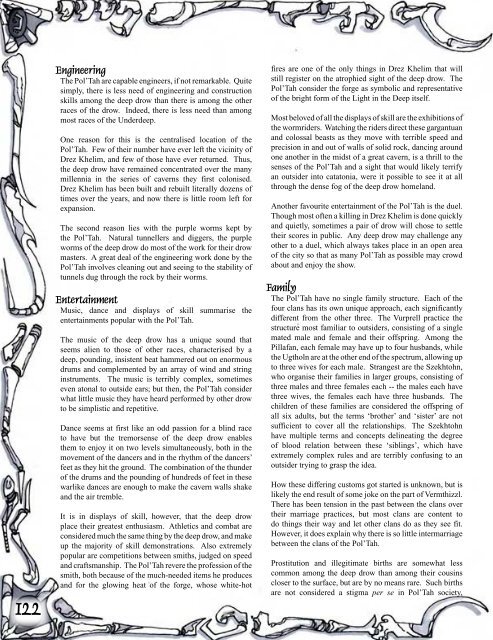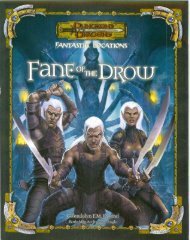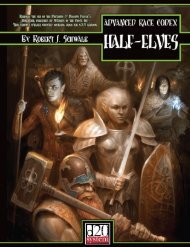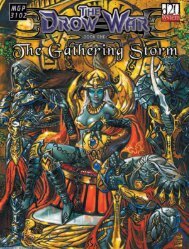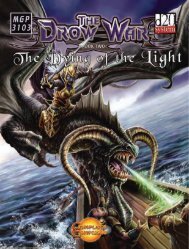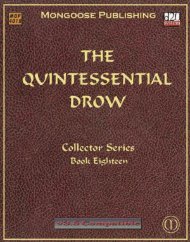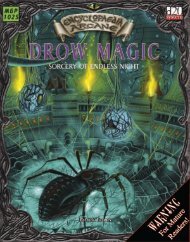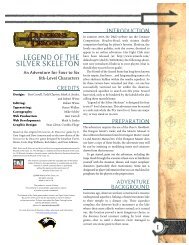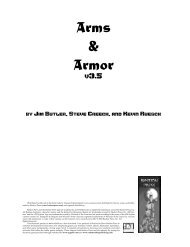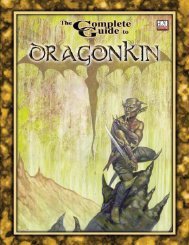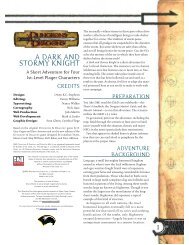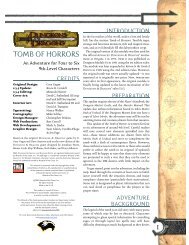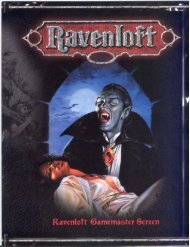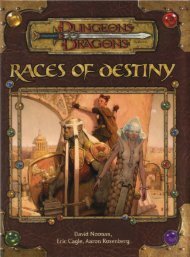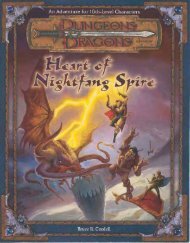Create successful ePaper yourself
Turn your PDF publications into a flip-book with our unique Google optimized e-Paper software.
122<br />
Engineering<br />
<strong>The</strong> Pol’Tah are capable engineers, if not remarkable. Quite<br />
simply, there is less need of engineering and construction<br />
skills among the deep drow than there is among the other<br />
races of the drow. Indeed, there is less need than among<br />
most races of the Underdeep.<br />
One reason for this is the centralised location of the<br />
Pol’Tah. Few of their number have ever left the vicinity of<br />
Drez Khelim, and few of those have ever returned. Thus,<br />
the deep drow have remained concentrated over the many<br />
millennia in the series of caverns they first colonised.<br />
Drez Khelim has been built and rebuilt literally dozens of<br />
times over the years, and now there is little room left for<br />
expansion.<br />
<strong>The</strong> second reason lies with the purple worms kept by<br />
the Pol’Tah. Natural tunnellers and diggers, the purple<br />
worms of the deep drow do most of the work for their drow<br />
masters. A great deal of the engineering work done by the<br />
Pol’Tah involves cleaning out and seeing to the stability of<br />
tunnels dug through the rock by their worms.<br />
Entertainment<br />
Music, dance and displays of skill summarise the<br />
entertainments popular with the Pol’Tah.<br />
<strong>The</strong> music of the deep drow has a unique sound that<br />
seems alien to those of other races, characterised by a<br />
deep, pounding, insistent beat hammered out on enormous<br />
drums and complemented by an array of wind and string<br />
instruments. <strong>The</strong> music is terribly complex, sometimes<br />
even atonal to outside ears; but then, the Pol’Tah consider<br />
what little music they have heard performed by other drow<br />
to be simplistic and repetitive.<br />
Dance seems at first like an odd passion for a blind race<br />
to have but the tremorsense of the deep drow enables<br />
them to enjoy it on two levels simultaneously, both in the<br />
movement of the dancers and in the rhythm of the dancers’<br />
feet as they hit the ground. <strong>The</strong> combination of the thunder<br />
of the drums and the pounding of hundreds of feet in these<br />
warlike dances are enough to make the cavern walls shake<br />
and the air tremble.<br />
It is in displays of skill, however, that the deep drow<br />
place their greatest enthusiasm. Athletics and combat are<br />
considered much the same thing by the deep drow, and make<br />
up the majority of skill demonstrations. Also extremely<br />
popular are competitions between smiths, judged on speed<br />
and craftsmanship. <strong>The</strong> Pol’Tah revere the profession of the<br />
smith, both because of the much-needed items he produces<br />
and for the glowing heat of the forge, whose white-hot<br />
fires are one of the only things in Drez Khelim that will<br />
still register on the atrophied sight of the deep drow. <strong>The</strong><br />
Pol’Tah consider the forge as symbolic and representative<br />
of the bright form of the Light in the Deep itself.<br />
Most beloved of all the displays of skill are the exhibitions of<br />
the wormriders. Watching the riders direct these gargantuan<br />
and colossal beasts as they move with terrible speed and<br />
precision in and out of walls of solid rock, dancing around<br />
one another in the midst of a great cavern, is a thrill to the<br />
senses of the Pol’Tah and a sight that would likely terrify<br />
an outsider into catatonia, were it possible to see it at all<br />
through the dense fog of the deep drow homeland.<br />
Another favourite entertainment of the Pol’Tah is the duel.<br />
Though most often a killing in Drez Khelim is done quickly<br />
and quietly, sometimes a pair of drow will chose to settle<br />
their scores in public. Any deep drow may challenge any<br />
other to a duel, which always takes place in an open area<br />
of the city so that as many Pol’Tah as possible may crowd<br />
about and enjoy the show.<br />
Family<br />
<strong>The</strong> Pol’Tah have no single family structure. Each of the<br />
four clans has its own unique approach, each significantly<br />
different from the other three. <strong>The</strong> Vurprell practice the<br />
structure most familiar to outsiders, consisting of a single<br />
mated male and female and their offspring. Among the<br />
Pillafan, each female may have up to four husbands, while<br />
the Ugtholn are at the other end of the spectrum, allowing up<br />
to three wives for each male. Strangest are the Szekhtohn,<br />
who organise their families in larger groups, consisting of<br />
three males and three females each -- the males each have<br />
three wives, the females each have three husbands. <strong>The</strong><br />
children of these families are considered the offspring of<br />
all six adults, but the terms ‘brother’ and ‘sister’ are not<br />
sufficient to cover all the relationships. <strong>The</strong> Szekhtohn<br />
have multiple terms and concepts delineating the degree<br />
of blood relation between these ‘siblings’, which have<br />
extremely complex rules and are terribly confusing to an<br />
outsider trying to grasp the idea.<br />
How these differing customs got started is unknown, but is<br />
likely the end result of some joke on the part of Vermthizzl.<br />
<strong>The</strong>re has been tension in the past between the clans over<br />
their marriage practices, but most clans are content to<br />
do things their way and let other clans do as they see fit.<br />
However, it does explain why there is so little intermarriage<br />
between the clans of the Pol’Tah.<br />
Prostitution and illegitimate births are somewhat less<br />
common among the deep drow than among their cousins<br />
closer to the surface, but are by no means rare. Such births<br />
are not considered a stigma per se in Pol’Tah society,


